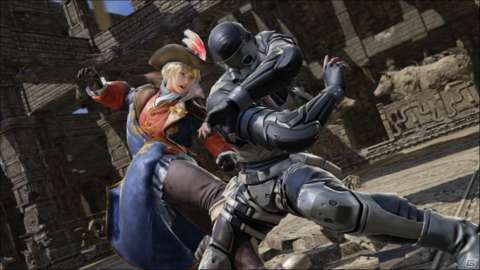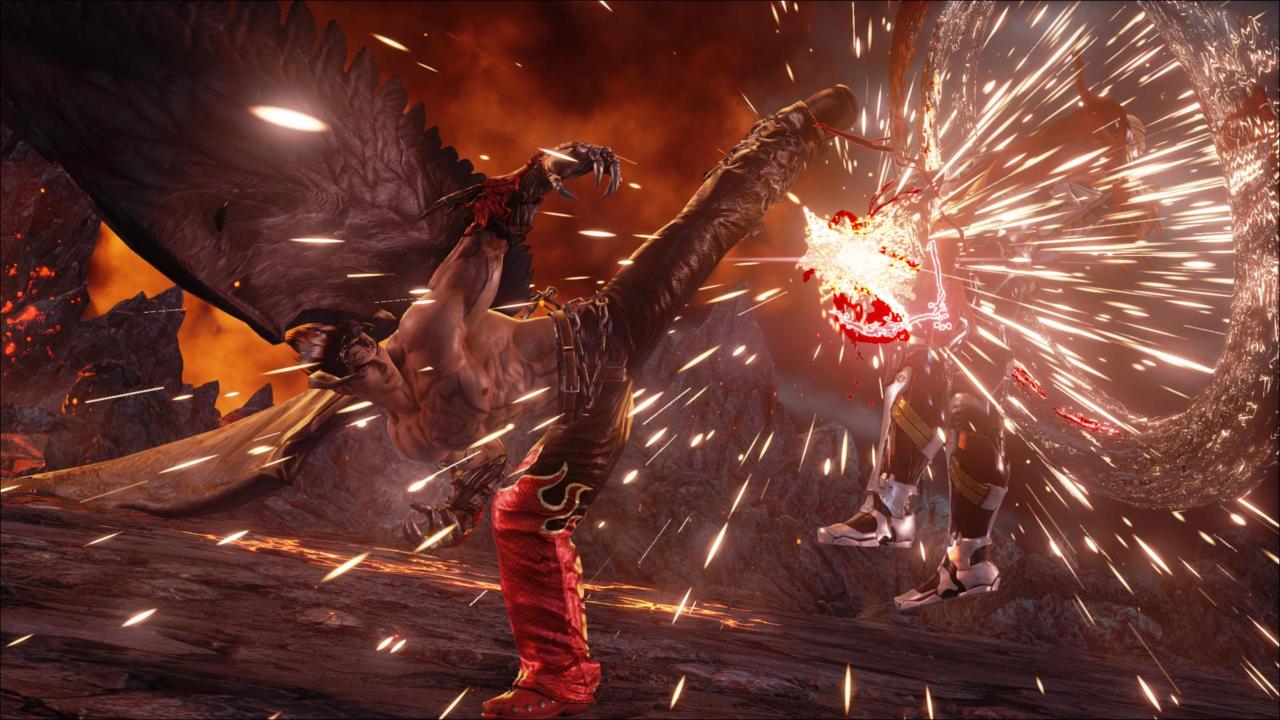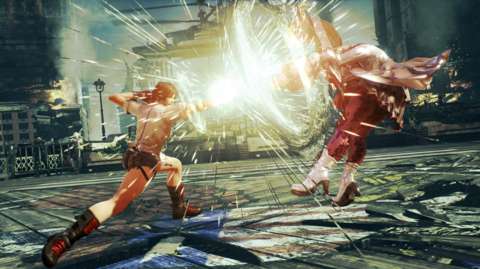With Tekken 7 on its way to consoles internationally, “the godfather of fighting games” Katsuhiro Harada is once again making his rounds. GameSpot sat down with Harada and Tekken 7 designer Michael Murray to talk about their favorite Tekken casters and players, casters, as well as what Harada really thinks of Capcom’s Yoshinori Ono and some deep thoughts on life.
GameSpot: Who is your favorite Tekken commentator?
Harada: Aris--now that he's a little bit more grown up--is one of the obvious choices because he's very entertaining. Then also MarkMan for MC and such. Rip is actually quite good for people who are new to the series and easy to understand. Personally, I like Tasty Steve. I don't know if you're all familiar with him. He's very hyped, very knowledgeable about both Tekken, but also Street Fighter and other fighting games. He's probably my favorite.
Who's your favorite U.S. Tekken player and your favorite non-U.S. player?
Harada: That's a very hard question. For the U.S. perhaps Mr. Naps. He's been a cornerstone of the American Tekken community for quite some time and he's always been very consistent. Outside of the U.S. is a very hard choice, but perhaps JDCR. He's someone I wouldn't want to go up against if I were in that position.
Murray: Me personally, for U.S. players, maybe he's not so well known, but Pokchop, he's from Atlanta. He's very entertaining, just the enthusiasm and passion he has for the game. He also knows how to work the crowd. For outside of the U.S. I would definitely have to go with--very orthodox choice--but Nobi, just because he knows so many characters so well. He goes beyond the typical way of how to play a certain character and comes up with his own unique way of using those and winning in a very flashy way. He's just so positive too. He's someone that everyone likes. I think he's a really good representative of the Tekken community.

Tekken Revolution was free-to-play. Would you ever consider using the same model for Tekken 7?
Harada: That's a difficult question because at first glance a fighting game looks like it might be something that would work well free-to-play. As you mentioned, we had Tekken Revolution free-to-play, and because the fighting game started in an arcade where you pay as you go, 100 Yen or $1 per play. We tried that online virtually and it's kind of tough, but then if you make the game totally free-to-play it's hard to get enough revenue to support the game. It was quite difficult. Honestly, for Tekken 7, I would rather have a package in a traditional way of selling the game so that we could include all of the elements that we want without changing the game design to match that model, but just to provide the Tekken everyone expects.
Many games are now implementing some rather extreme measures to punish rage quitters and prevent people from stopping mid-match. Once Tekken 7: Final Retribution is out, how do you plan to stop or punish rage quitters?
Harada: Tekken 7 started in the arcade, where it’s very hard to pull out the LAN cable. Tekken 7 is actually the first fighting game in arcades that does networking battles now, but we don't have that problem to date because the users themselves can't shut off LAN. When we make the jump to console…We haven't really mentioned our plans regarding rage quitting so far. We can say that we are keeping our eyes on what other titles are doing and what other users expect, what kind of expectations they have regarding that. In the past. Tekken has also displayed players’ disconnect rate before you decide to fight them and then the chooser could decide not to fight that person if the disconnect rate was pretty high. We have done some things like that in the past already and we're still thinking about what to do at this time.
Harada: Back when I used to play Ultima Online, when someone would do something bad like be very vulgar or rude to someone, they would get thrown in a virtual jail where their character was on display. They were muted, but people could say whatever they wanted to those people for a few hours and the person had to endure that if they wanted to continue playing outside of that. To have something similar for Tekken would be interesting. If you had a rage quitter in a virtual jail and you have to fight another rage quitter until they win, they can't escape, and their main character would be locked on the main character select screen, it would be a fun way to address that.
In Tekken 7, Nina is wearing a wedding gown. Who's the groom?
Harada: We can't go into many details regarding the story, but what you can expect is that Nina is an assassin by trade so obviously if you envision maybe it's some particular job, or mission, or something that requires her to be in that kind of dress… It's not that she's going to get married, or have kids, or anything like that now.
Murray: Maybe some fans who really like Nina a lot can imagine that they're going to be the groom, I guess you could say, to be for Nina.
Do you think the Tekken franchise would make a good dating sim?
Harada: Probably not. [laughter] I do know one fangirl out there who's been asking us for that for some number of years.
What is the single most important piece of advice that you would give to a newcomer to the Tekken franchise?
As a player you mean?

Yes, as a player.
Harada: Tekken 7, it's already released in the arcade. It was designed to be easier for newcomers, the game system and such. We've also received feedback from the players that this is the case, that they found it very easy to pick up after a long absence or if they're just starting out. They mentioned that one of those elements is that you don't need to know a whole lot of character's techniques to play the game effectively, that there's a few that you have to watch out for or if it's fewer techniques you can use effectively to win. There's also the new editions that make that more easy as well. The Rage Arts, which are special finishing move, or the Rage Drive new techniques. Both of these elements allow people to come back from a losing situation if used effectively. To keep those in mind would be some appropriate advice.
You can't answer “Tekken,” but what fighting game do you feel is the most honest in terms of balancing and fairness.
Harada: That's kind of a difficult question because what is fair in my opinion might change if the [player] is a novice or a higher level. If you had to pick one, perhaps Virtua Fighter 2 is something that at that time was considered a very, very well balanced fighting game. Who knows? If people were playing that today, both novice or advanced players, there might be a different consensus then back then. That would probably be the choice.
Tekken 1 could be, I think anyway, considered fair depending on your perspective, although all the characters were thought to be pretty broken. Pretty much everyone had a combo that could lead to 80 or 90% off of your life gauge. But since everyone had it, then depending on how you viewed that, that could be viewed as fair.
I have to ask about Tekken X Street Fighter. Where is it?
Harada: That's a difficult question to answer. When we develop fighting games, we try to keep the core community in mind as well as the wider audience that wants to play these games. But currently the situation is with fighting games, you have Street Fighter V that just released--a lot of people are playing that fervently--and there's a large crowd out there waiting or Tekken 7. We don't want to split these communities, so a good window in which to release Tekken x Street Fighter is something that's become difficult recently. So it's on hold for the moment.
It's my understanding that you recently had a child. How has this changed your life both inside and outside of game development?
Harada: The child is actually one and a half years old now. One thing that's changed quite a bit was the relationship with people who work for me. Game development is quite brutal depending on the timing. And someone would take off because they needed to take their child somewhere. It was often the case it'd be like, "Why do you need to do that?" This is something that is quite common in Japan for people who are in a very strict business, "Well you have a wife don't you? Why can't they handle it? You should focus on your job."
Murray: He was quite strict. I know from experience.
Harada: I’ve a little bit more understanding in those cases now because I have my own child and it's much easier to experience that firsthand. Back when I first was working on Tekken, the story of the Mishimas…. You've got Heihachi, you've got Kazuya, and later on Jin. They were all family and they're feuding and they're very horrible to each other. They were throwing each other off cliffs and such. When you have a child… I already respected my family to a certain extent, but it makes it even deeper when you become a parent yourself and you realize what your parents went through when rearing you. I have an even deeper respect for my family and parents in particular. To look at the Mishimas now from that perspective, it's hard to imagine a family that bad.
I got married quite later on in life, like 40, but when I was single I thought, you see it in the animal kingdom all the time. The lions would throw their young off a cliff or into danger to make them stronger. Now, from this new gained understanding, it's hard to think that a human would do that to their own offspring. I even have this more profound understanding of how bad Heihachi and the Mishimas are.

One of our other editors Tamoor Hussain interviewed [Yoshinori] Ono-san earlier this year. Ono-san told us that he was once mistakenly identified as you by an interviewer. Have you ever mistaken for Ono-san?
Harada: There is one. I think we were in the U.K. Ono-san was with us and I think the media was from the U.K. I'm not sure. They were your casual audience. They didn't know a whole lot about gaming and they just happened to be at the event. When we came in, they said, "Oh, hello Mr. Ono." to me, and the opposite for Ono. We both looked at each other and they thought, "Ah, let's do this." And we’d be their other counterpart, so I went on about the Street Fighter series and the history and the legacy and Ono-san the same for Tekken. The whole time the press had no idea. I'm sure that the viewers told them that when they actually aired it because it was an actual TV crew.
That would be very embarrassing. Ono-san also said that you, "smell like a fresh spring flower". What do you think Ono-san smells like?
Harada: I don't know if he necessarily smells like napalm, but our image of Ono-san is he's always very passionate and very energetic. So it's almost like he's on fire all the time. I wouldn't say that he smells like sweat, it's that passion, so maybe napalm.
It might be a little bit different from his actual appearance, but he has refined tastes. We don't know if he has a sense or not, but he's very interested in fashion, he's very interested in cars and things like that. He has very fine tastes I guess you could say.
Another part of our image of Ono-san is he uses all those funds that people give him through buying his game to purchase a brand new car every three years, a very nice one that everyone's heard of. That's kind of our image of him. I often get Ono-san to drive me home when we go out somewhere.
He recently started growing a beard. Do you think he's doing this to look more like you?
Harada: We don't know the reason behind it, but if we had to guess it would be that Ono-san and I are often in the same interviews together, and just because a lot of the time the fashion that Ono-san chooses is shorts and T-shirts and such, and because he's Asian, perhaps for the West he might look a lot younger than he actually is. Maybe that's to give him that added air of authority or maybe it could be that he's very busy and doesn’t have enough time to shave. It could be either/or.

You used to work in an arcade. What is the weirdest thing you ever saw or had to do while you had that job?
Harada: Back in the day, I was in Shizuoka, which is actually the location of.. .If you know Sega's game Yakuza, that's where you go around, there. Our arcade was in that area, so there were a lot of Yakuza back in the day. They would come in and ask for protection money, and as a company we didn't pay that. It was always the case that we would send them away. It was usually the low level Yakuza, punks, per se. But one day we had these three guys in suits that looked like the real deal and I was quite young at the time and I got kind of scared, and I went to the back office and got the manager.
The manager said, "Harada, go in the back and hide for ten minutes and I'll take care of it." There's these three guys in suits and they look like high level authority members of the Yakuza. The manager comes back later and he goes, "Harada you fool. What are you doing? That was actually one of our company employees." He was very famous in our company, the guy in charge of regional sales at that time for the arcade division, it was actually him and some of our company people. He looked exactly like the real thing and I got scared.
Last question. What is your single most important piece of advice about life?
Harada: It's a very hard question. It's hard for anyone to know the purpose of your own life because you don't know why you're born. Everyone dies at some point so it doesn't matter how much money or things you collect, you can't take it with you and no one knows what's at the end after that. While you're alive, the one thing that I think is most important--recently to me--is to try to have these moments where you think, "Oh, it's so great that I'm alive because I was able to do this particular thing or accomplish this." To try to pack as many of those in as you can in a particular year. For me, I’m mid 40s, so if you look at the average male's lifespan you have 70 something, so I have 30 years left. Even if there's one per year of that "Man, I'm really glad I'm alive" moment, I only have 30 left of those. To try to even pack more than that one per year and as many as I can is probably the biggest thing that I think of recently. The best advice that I would give to someone is to try to make as many of those as you can while you're still here.
Murray: For me, I guess it's similar, as in: do what makes you happy. But what you think is going to make you happy and what actually does, there's often a large gap between the two. While you're young you might be chasing, you want to be popular, or you want to be one of the cool kids, or you want to be rich or have things, and like [Harada-san] is saying, that changes depending where you are in your life. For him, after having a kid, that's changed drastically. For me now, just because being out in the community and being well known, people say all kinds of stuff. If you let that get to you then that destroys your happiness. Even if it's not that, people are trying to impress someone at work, trying to impress whoever it is... I think that the main thing you need to do is impress yourself. That would be my advice for anyone. At the end of the day you have to be happy with your own self, so do what makes you happy and don't listen to everyone else.

